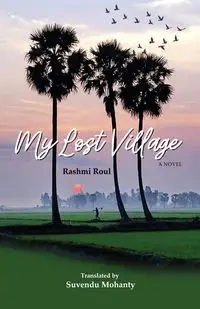My Lost Village - Roul Rashmi
Srimayi visits her village with her daughter, Khusi, taking a break from her hectic and tedious city life. Nature's healing power soothed her soul while she strolled with her niece Rupa on Naib's homestead. The majestic and untouched beauty of the surroundings gets gradually polluted and decayed with the influx of city lifestyle. Foreign liquor shops are open in the village. The village youth spoil their life. Some known persons are still alive, while some are not. The innocence of village life is smothered by cut-throat competition and rat race, as observed in city life. People have been self-centred because of political interference and modernization. Loneliness pervades everywhere. Love and affection get blighted. Hypocrisy knocks on the doors of innocent lives.
Nobody can forget the village life, people, and the arresting beauty of the countryside. The village always occupies a happy seat in one's heart. Emotions and passions are attached to every object of Nature. Nowadays, the electricity replaces the kerosene lamps and lanterns. The electrical gadgets are used best. Srimayi recollects her grandmother's stories, the flowers of ridge gourd, and cucumber creepers on the people's hedges in the early dusk. On one side, she misses the villagers' erstwhile love and affection; on the other, she thinks about how the village youth get infatuated with love, barring all kinds of social parameters. The novelist pines for what is missing in the present village life. Now, the age has changed, and the village has been modernized. The natural flow of life is shrouded with artificiality. Artificial fertilizers and insecticides poison the taste of crops, cereals and vegetables. Many animals and birds are not seen in the village. Youth need to show more interest in ploughing or cultivating the farmland. Healthy relationships between communities get fissured and punctured. Minor issues are taken up to the police station and court. Nobody pays any heed to the older people's decisions. The simplicity of the village life is lost. At the novel's end, the novelist doubts whether the villagers can protect their culture or whether it will be assimilated into the city culture. Hence, the title of the book "My Lost Village" is appropriately justified.
The novel seems autobiographical. The novelist's childhood life in Langeleswar village of Balasore district is the setting for this work of art. It happens in everybody's life. This pastoral setting of the novel can appeal to readers with human sensibility.
EAN: 9781645605768




Srimayi visits her village with her daughter, Khusi, taking a break from her hectic and tedious city life. Nature's healing power soothed her soul while she strolled with her niece Rupa on Naib's homestead. The majestic and untouched beauty of the surroundings gets gradually polluted and decayed with the influx of city lifestyle. Foreign liquor shops are open in the village. The village youth spoil their life. Some known persons are still alive, while some are not. The innocence of village life is smothered by cut-throat competition and rat race, as observed in city life. People have been self-centred because of political interference and modernization. Loneliness pervades everywhere. Love and affection get blighted. Hypocrisy knocks on the doors of innocent lives.
Nobody can forget the village life, people, and the arresting beauty of the countryside. The village always occupies a happy seat in one's heart. Emotions and passions are attached to every object of Nature. Nowadays, the electricity replaces the kerosene lamps and lanterns. The electrical gadgets are used best. Srimayi recollects her grandmother's stories, the flowers of ridge gourd, and cucumber creepers on the people's hedges in the early dusk. On one side, she misses the villagers' erstwhile love and affection; on the other, she thinks about how the village youth get infatuated with love, barring all kinds of social parameters. The novelist pines for what is missing in the present village life. Now, the age has changed, and the village has been modernized. The natural flow of life is shrouded with artificiality. Artificial fertilizers and insecticides poison the taste of crops, cereals and vegetables. Many animals and birds are not seen in the village. Youth need to show more interest in ploughing or cultivating the farmland. Healthy relationships between communities get fissured and punctured. Minor issues are taken up to the police station and court. Nobody pays any heed to the older people's decisions. The simplicity of the village life is lost. At the novel's end, the novelist doubts whether the villagers can protect their culture or whether it will be assimilated into the city culture. Hence, the title of the book "My Lost Village" is appropriately justified.
The novel seems autobiographical. The novelist's childhood life in Langeleswar village of Balasore district is the setting for this work of art. It happens in everybody's life. This pastoral setting of the novel can appeal to readers with human sensibility.
EAN: 9781645605768

